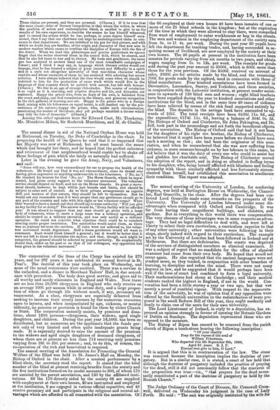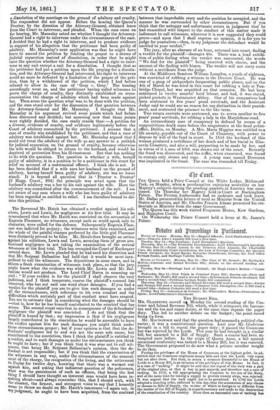The Judge Ordinary of the Court of Divorce, Sir Cresswell
Cress- well, delivered on Wednesday his judgment in the case of Lady Forth. He said: "The suit was originally instituted by the wife for _a dissolution of the marriage on the ground of adultery and cruelty. The respondent did not appear. Before the hearing the Queen's Proctor, by the direction of the Attorney-General, obtained leave from the Court to intervene, and pleaded. When the case came on for hearing, Mr. Macaulay asked me whether I thought the Attorney- General had a right'to intervene under the circumstances of the case. I decided that he had a right to intervene, and to produce evidence in support of his allegation that the petitioner had been guilty of adultery. Mr. Macaulay's next application was that he might have leave to amend the petition by limiting the prayer to a decree of judicial separation instead of dissolution, in order that he might raise the question whether the Attorney-General had a right to inter- vene in any suit except a suit for a dissolution. I thought that as the petitioner had put a petition upon the file praying for a dissolu- tion, and the Attorney-General had intervened, his right to intervene could no more be defeated by a limitation of the prayer of the peti- tion, than by a withdrawal of the petition, which I had before refused to allow in the case -of Gray v. Gray.' The hearing accordingly went on, and the petitioner having called witnesses to prove the charge of cruelty, they distinctly established on cross. examination the charge of adultery which had been made against her. Then arose the question what was to be done with the petition, and the case stood over for the discussion of that question between the Attorney-General and Mr. Macaulay. I thought that Mr. Macaulay in his argument revived some points which had before bees. discussed and decided; but assuming now that those points were rightly decided, the case really stands thus :—A petition for a divorce, evidence of cruelty, and evidence legitimately before the Court of adultery committed by the petitioner. I assume that a case of cruelty was established by the petitioner, and that a case of adultery was established against her. -Mr. Macaulay argued that I could not treat the adultery of the wife as any answer to a petitioh for judicial separation on the ground of cruelty, because otherwise the wife would be obliged to return to the husband, and would be deprived of protection from his ill-treatment. Bat that has nothing to do with the question. The question is whether a wife, herself guilty of adultery, is in a position to be a petitioner in this court for relief on account of a matrimonial offence. I think she is not. It has been decided that if a wife sues her husband on the ground of adultery, having herself been guilty of adultery, she has no locus standi. It is beyond all question that in Proctor v. Proctor' (2 Hagg. Const., 292) the principle was acted upon that the husbands adultery was a bar to his suit against the wife. Here the adultery was committed after the commencement of the suit. I am not aware of any case where a wife who has been guilty of adultery has been regarded as entitled to relief. I am therefore bound to dis- miss this petition."































 Previous page
Previous page